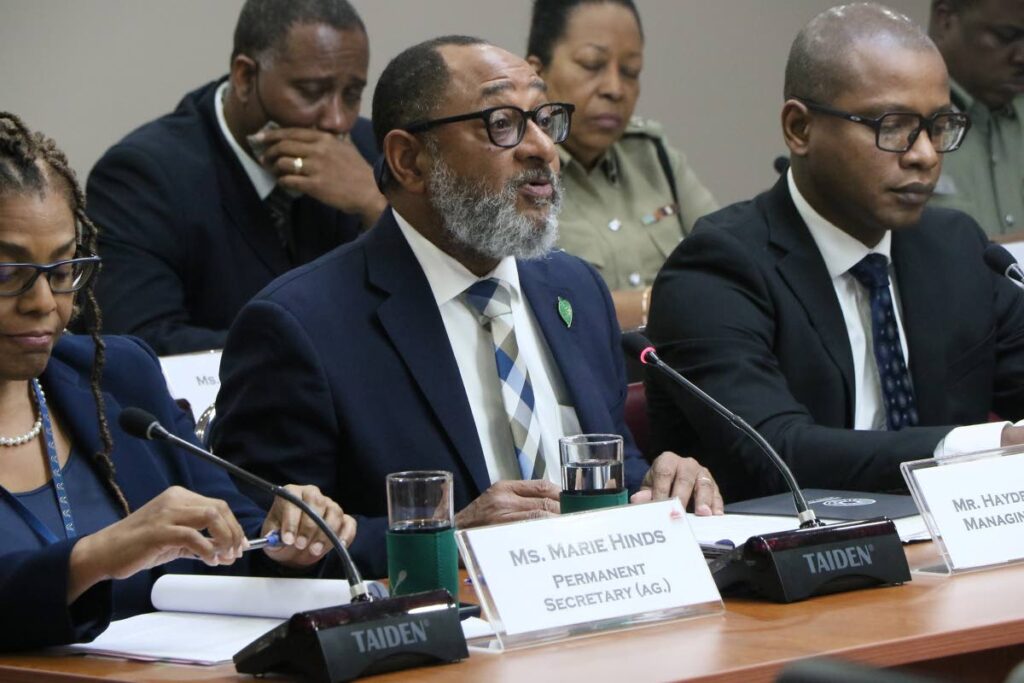Plenty noise at JSC over EMA and noise pollution

A parliament committee on Wednesday unearthed deep frustration over the regulation of noise pollution, with two committee members venting their own experiences and both the police service and Environmental Management Authority (EMA) revealing uncertainties clouding their operations.
The Joint Select Committee (JSC) on Local Authorities, Service Commissions and Statutory Authorities, chaired by Dr Varma Deyalsingh, interviewed teams led by EMA head Hayden Romano, Ministry of Planning and Development permanent secretary Marie Hinds, and police service ACP Collis Hazel and ACP Sharon Cooper.
The EMA are awaiting the Appeal Court's ruling on a promoter who won a case against the EMA in the High Court the JSC heard, while the police said they would be willing to relinquish their responsibility for noise enforcement to another agency such as the EMA.
Deyalsingh said noise pollution was "a public health hazard."
He said it can cause high blood pressure, heart problems, diabetes, insomnia, depression and anxiety, while harming children's academic performance.
Deyalsingh said noise pollution was an issue of environmental justice, with lower income and minority groups worst affected globally.
Hailing Germany for reducing its acoustic footprint, Deyalsingh declared, "We have to give citizens some relief."
Romano said noise pollution was "an area of tremendous concern", with 900 noise complaints to the EMA's hotline from 2018-2022. He said the EMA's remit was commercial and industrial noise, governed by the EMA Act and its Noise Pollution Control Rules, Summary Offences Act, and nuisance under common law.
Romano said the covid19 period had seen fewer noise complaints which have since risen. He said the EMA police have the powers of regular police. While previously the EMA police amplified noise events for three hours to assess, this period was now 30 minutes. Romano said the EMA wanted a ban on noisy fireworks, given their damage to human and animal health, as outlined in its 2021 position paper now on its website. He hoped the JSC sitting would kick-start a national dialogue.
Romano said the EMA can approve a noise variation to an event, but may later advise the volume be reduced.
JSC member Khadijah Ameen said the public wants to know how to get action against noise makers, saying people's numerous complaints to the police and EMA have brought no action in noise reduction nor enforcement in areas such as Trincity and Valsayn South. She urged bars in areas like Curepe have stipulated hours of operation such as up to 11 pm or midnight. "Who goes out, besides the MP and the councillor, when they (residents) are calling down our phone?"
Romano said under the EMA Act, the EMA may request a noise-maker to lower their volume, or otherwise register him in breach.
"The challenge with that is that it is not immediate relief."
Ameen remarked, "There is a perception that the EMA does not have the teeth to shut down events."
Deyalsingh suggested a ticketing system for noise polluters similar to that used for errant drivers.
EMA legal officer Maurice Wishart said bars were regulated firstly by planning permission laws and then by liquor licensing laws, and then an EMA notice of violation for any noise violations. When Deyalsingh asked about noise-making individuals, Wishart said that was the remit of the police.
JSC member Jayanti Lutchmedial said her proverbial 100 phone calls to San Fernando Police Station to complain about noise had resulted on "zero response."
Given problems of enforcement, she asked why permission was given for noisy fetes at the SAPA car park while two homes for the elderly were nearby. She said over the years she had never seen any flyers warning of these noisy events (as earlier suggested by Romano.)
Lutchmedial said the police mandated hired for fetes should also monitor noise levels, not the EMA.
She wondered why the EMA do not attend bar licensing sessions. Wishart said it was the police's duty to attend and they can consult widely including the EMA.
Ameen said the public - often unable to sleep at night - have repeatedly notified the EMA and police of noise pollution, yet got largely no redress.
While noise must be sustained for 30 minutes to be classed as noise pollution, EMA assistant technical manager Jiselle Joseph suggested difficulty in this, but JSC member Laurence Hislop said if his house three streets away from an event was vibrating with noise, the offence would be clear.
Lutchmedial said noisy parties had patterns of sound likely to be varied over 30 minutes.
"The method of detecting and enforcing has to be improved." Ameen said the EMA was ineffective against curbing noise and he asked about its challenges.
Romano said the EMA has just 13 officers, but needed 40. Within this, JSC member Lisa Morris-Julian said the EMA's noise unit had four employees.
Romano expected more staff in that unit by October.
Cooper said police officers have nothing to test noise levels at fetes but routinely made suggestions to promoters on how to reduce noise levels. The police have ten noise meters but are awaiting training by the EMA, she said.
Later, Lutchmedial asked if agencies like the EMA should take over the police's role against noise pollution. Cooper replied,"We would totally support that."
She promised to supply information on the number of complaints of nuisance and the number of approvals for firework use. Romano said the EMA does not regulate noise from moving vehicles such as party trucks and party boats, but cited the police and Transport Division in the Ministry of Works and Transport.
Deyalsingh asked about noise-makers at the beach, to which Hazel said the police use moral suasion.
The chairman concluded by saying next month the JSC would interview NGOs and fete promoters.

Comments
"Plenty noise at JSC over EMA and noise pollution"